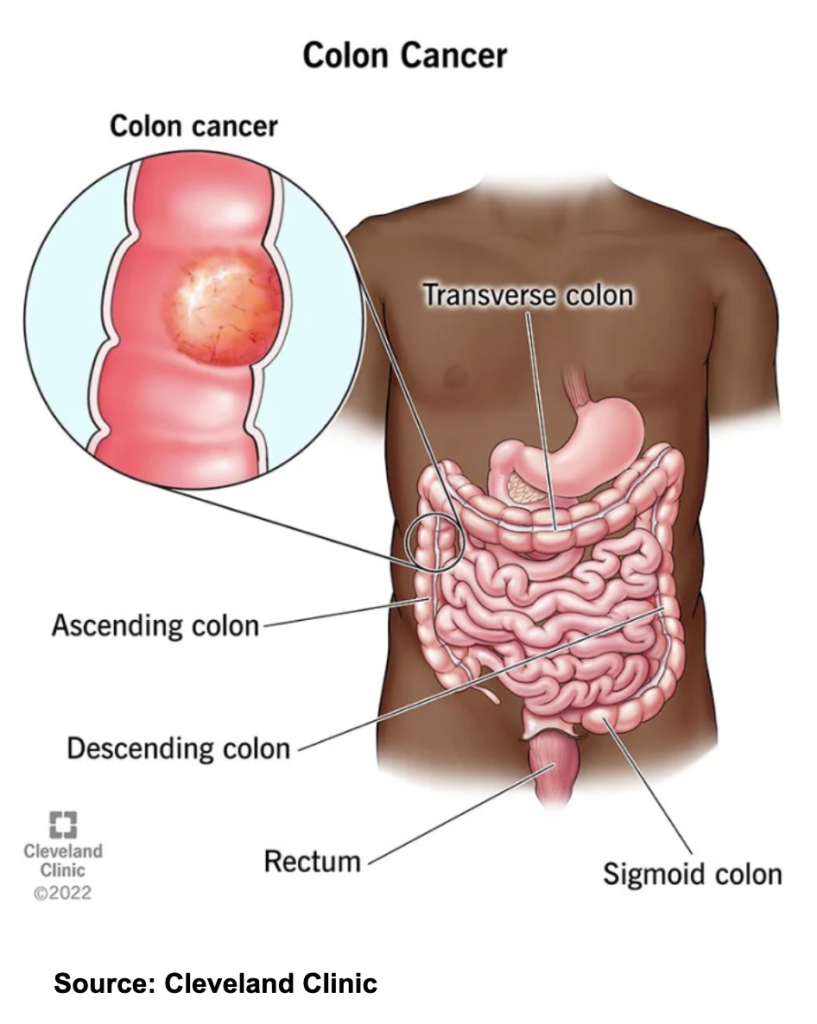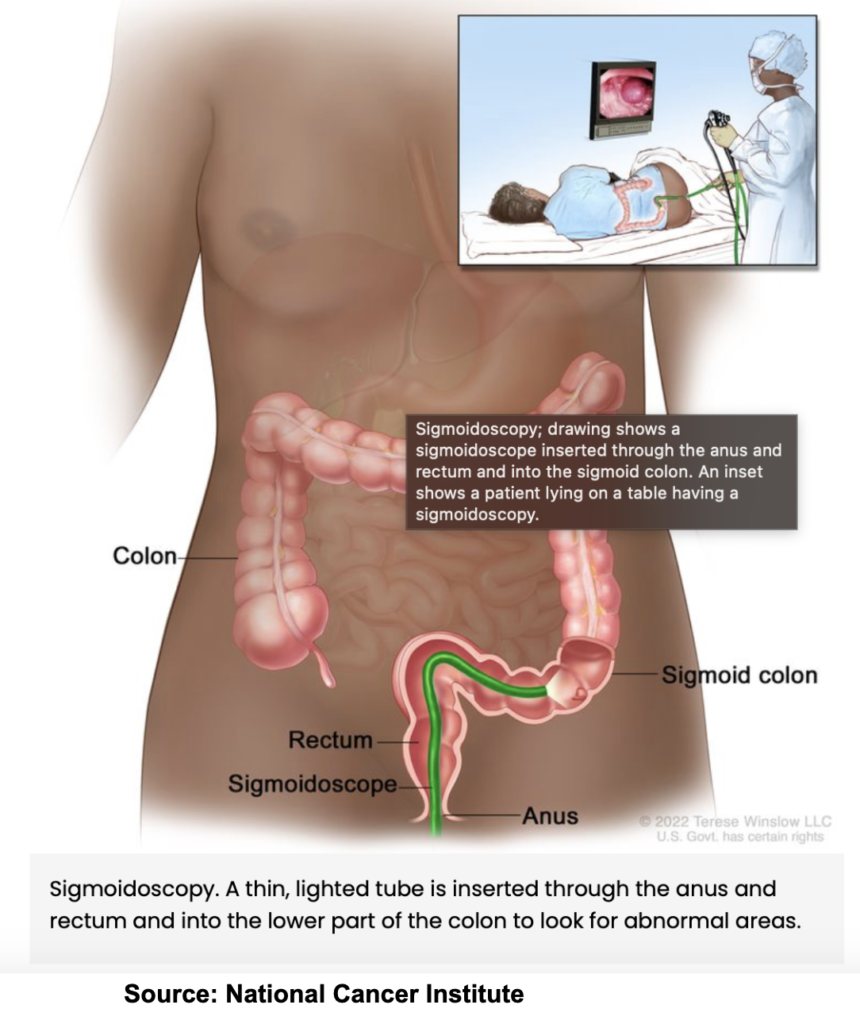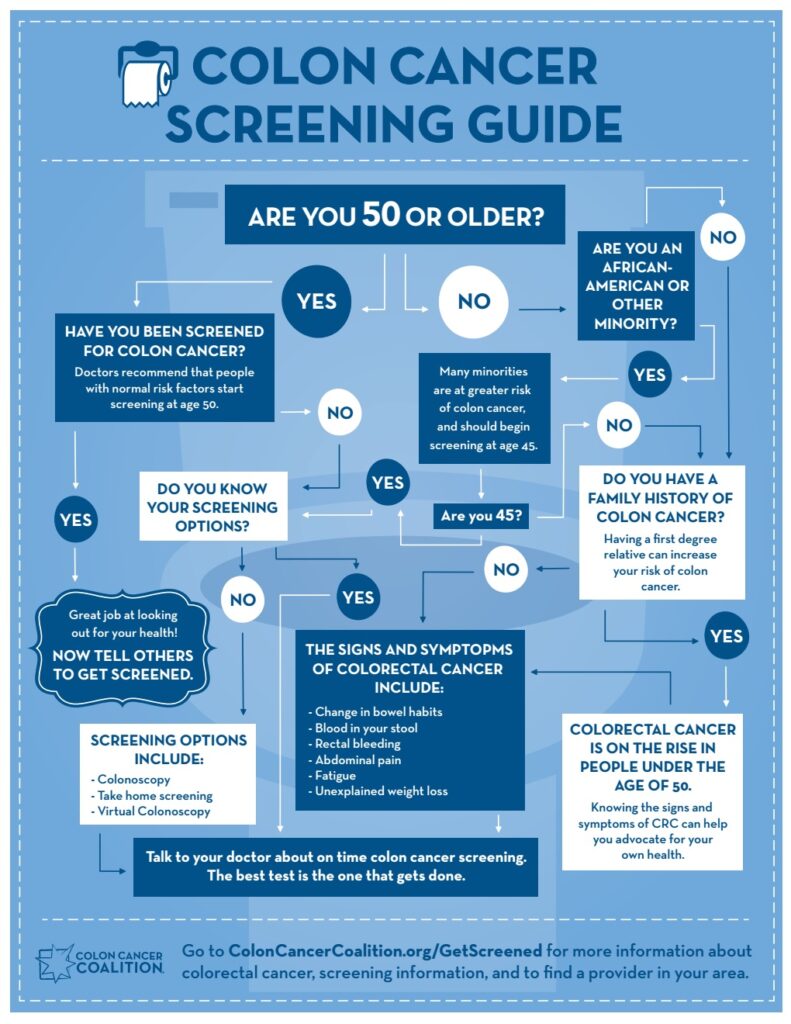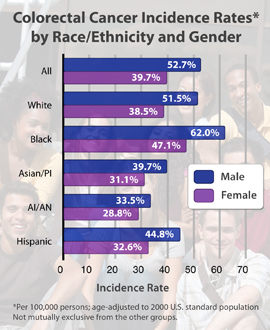Colorectal Colon Cancer
Knowing your risk factors, adopting healthy habits and getting screened can help empower your health journey.
COLORECTAL COLON CANCER
Lifestyle changes reduce your risk of colon cancer
Knowing your risk factors, adopting healthy habits and getting screened can help empower your health journey.
What is colorectal/colon Cancer?
- Colorectal cancer is a disease in which cells in the colon or rectum grow out of control. Sometimes it is called colon cancer, for short. The colon is the large intestine or large bowel.
- The rectum is the passageway that connects the colon to the anus.
- Sometimes abnormal growths, called polyps, form in the colon or rectum. Over time, some polyps may turn into cancer.
- In 2019, the latest year for which incidence data are available, in the United States, 142,462 new cases of Colon and Rectum cancer were reported, and 51,896 people died of this cancer.
symptoms
- A change in bowel habits.
- Blood in or on your stool (bowel movement).
- Diarrhea, constipation, or feeling that the bowel does not empty all the way.
- Abdominal pain, aches, or cramps that don’t go away.
- Weight loss and you don’t know why.
Risk Factors
- Older age. Colon cancer can be diagnosed at any age, but a majority of people with colon cancer are older than 50. The rates of colon cancer in people younger than 50 have been increasing, but doctors aren’t sure why.
- African American race. African Americans have a greater risk of colon cancer than do people of other races.
- A personal history of colorectal cancer or polyps. If you’ve already had colon cancer or noncancerous colon polyps, you have a greater risk of colon cancer in the future.
- Inflammatory intestinal conditions. Chronic inflammatory diseases of the colon, such as ulcerative colitis and Crohn’s disease, can increase your risk of colon cancer.
- Inherited syndromes that increase colon cancer risk. Some gene mutations passed through generations of your family can increase your risk of colon cancer significantly. Only a small percentage of colon cancers are linked to inherited genes. The most common inherited syndromes that increase colon cancer risk are familial adenomatous polyposis (FAP) and Lynch syndrome, which is also known as hereditary nonpolyposis colorectal cancer (HNPCC).
- Family history of colon cancer. You’re more likely to develop colon cancer if you have a blood relative who has had the disease. If more than one family member has colon cancer or rectal cancer, your risk is even greater.
- Low-fiber, high-fat diet. Colon cancer and rectal cancer may be associated with a typical Western diet, which is low in fiber and high in fat and calories. Research in this area has had mixed results. Some studies have found an increased risk of colon cancer in people who eat diets high in red meat and processed meat.
- A sedentary lifestyle. People who are inactive are more likely to develop colon cancer. Getting regular physical activity may reduce your risk of colon cancer.
- Diabetes. People with diabetes or insulin resistance have an increased risk of colon cancer.
- Obesity. People who are obese have an increased risk of colon cancer and an increased risk of dying of colon cancer when compared with people considered normal weight.
- Smoking. People who smoke may have an increased risk of colon cancer.
- Alcohol. Heavy use of alcohol increases your risk of colon cancer.
- Radiation therapy for cancer. Radiation therapy directed at the abdomen to treat previous cancers increases the risk of colon cancer.
Ways to Prevent
Eat a variety of fruits, vegetables, and whole grains. Fruits, vegetables, and whole grains contain vitamins, minerals, fiber and antioxidants, which may play a role in cancer prevention. Choose a variety of fruits and vegetables so that you get an array of vitamins and nutrients.
Drink alcohol in moderation, if at all. If you choose to drink alcohol, limit the amount of alcohol you drink to no more than one drink a day for women and two for men.
Stop smoking. Talk to your doctor about ways to quit that may work for you.
Exercise most days of the week. Try to get at least 30 minutes of exercise on most days. If you’ve been inactive, start slowly and build up gradually to 30 minutes. Also, talk to your doctor before starting any exercise program.
Maintain a healthy weight. If you are at a healthy weight, work to maintain your weight by combining a healthy diet with daily exercise. If you need to lose weight, ask your doctor about healthy ways to achieve your goal. Aim to lose weight slowly by increasing the amount of exercise you get and reducing the number of calories you eat.



screening/detection
Doctors recommend that people with an average risk of colon cancer consider colon cancer screening around age 45. But people with an increased risk, such as those with a family history of colon cancer, should consider screening sooner.
Colorectal cancer almost always develops from precancerous polyps (abnormal growths) in the colon or rectum.
Screening tests can find precancerous polyps, so that they can be removed before they turn into cancer. Screening tests can also find colorectal cancer early when treatment works best.
Stool Tests
The guaiac-based fecal occult blood test (gFOBT) uses the chemical guaiac to detect blood in the stool. It is done once a year. For this test, you receive a test kit from your healthcare provider. At home, you use a stick or brush to obtain a small amount of stool. You return the test kit to the doctor or a lab, where the stool samples are checked for the presence of blood.
The fecal immunochemical test (FIT) uses antibodies to detect blood in the stool. It is also done once a year in the same way as a gFOBT.
The FIT-DNA test (also referred to as the stool DNA test) combines the FIT with a test that detects altered DNA in the stool. For this test, you collect an entire bowel movement and send it to a lab, where it is checked for altered DNA and for the presence of blood. It is done once every three years.
Colonoscopy
This is similar to flexible sigmoidoscopy, except the doctor uses a longer, thin, flexible, lighted tube to check for polyps or cancer inside the rectum and the entire colon. During the test, the doctor can find and remove most polyps and some cancers. Colonoscopy also is used as a follow-up test if anything unusual is found during one of the other screening tests.
- How often? Every 10 years (for people who do not have an increased risk of colorectal cancer).
CT Colonography (Virtual Colonoscopy)
Computed tomography (CT) colonography, also called a virtual colonoscopy, uses X-rays and computers to produce images of the entire colon, which are displayed on a computer screen for the doctor to analyze.
- How often? Every 5 years.
Sigmoidoscopy is a procedure to look inside the rectum and sigmoid (lower) colon for polyps, abnormal areas, or cancer. A sigmoidoscope is inserted through the rectum into the sigmoid colon. A sigmoidoscope is a thin, tube-like instrument with a light and a lens for viewing. It may also have a tool to remove polyps or tissue samples, which are checked under a microscope for signs of cancer.
Diagnosis/treatment
Diagnosis
If you’ve been diagnosed with colon cancer, your doctor may recommend tests to determine the extent (stage) of your cancer.
- Staging helps determine what treatments are most appropriate for you.
- Staging tests may include imaging procedures such as abdominal, pelvic and chest CT scans. In many cases, the stage of your cancer may not be fully determined until after colon cancer surgery.
- The stages of colon cancer are indicated by Roman numerals that range from 0 to IV, with the lowest stages indicating cancer that is limited to the lining of the inside of the colon. By stage IV, the cancer is considered advanced and has spread (metastasized) to other areas of the body.
Treatment
If you have colon cancer or rectal cancer, you will likely have surgery, radiation therapy, or chemotherapy — or some combination of these treatments.
- Surgery is often the first choice for many early-stage colon cancers and most rectal cancers. During a colonoscopy, for instance, doctors remove diseased tissue using instruments passed through a colonoscope (a long, narrow tube inserted into the body through the anus).
- Radiation therapy employs X-rays or other types of radiation to destroy cancer cells.
- Chemotherapy utilizes medicines that kill cancer cells and shrink tumors.
What’s more, researchers have been making important advances in the emerging field of targeted therapy — drugs that attack cancer cells with unique genetic or protein targets. - Scientists are also actively investigating immunotherapy, which uses the body’s own immune system to battle cancer. Clinical studies have shown that immunotherapy drugs called checkpoint inhibitors can help a small subset of colorectal cancer patients whose tumors have specific genetic changes.

STATISTICS FOR PEOPLE OF COLOR

- Colorectal cancer also disproportionately affects the Black community, where the rates are the highest of any racial/ethnic group in the US.
- African Americans are about 20% more likely to get colorectal cancer and about 40% more likely to die from it than most other groups.
- Studies show that a Black man is 24% more likely to get colorectal cancer than a white man and 47% more likely to die from it.
- Black women are also more vulnerable, with risks that are 19% and 34% higher, respectively.
Learn more about the Stats at GRAAHI's Health Equity Index
Links, Tools, Resources
News
https://www.ncbi.nlm.nih.gov/pmc/articles/PMC8277405/
https://health.ucdavis.edu/synthesis/issues/winter2021/patient_focus/chadwick-boseman.html
https://www.everydayhealth.com/cancer/living-with-lynch-syndrome/
Links, Tools, Resources
https://www.ccalliance.org/colorectal-cancer-information/resources-for-patients
https://www.ccalliance.org/colorectal-cancer-information/resources-for-family-members-caregivers
https://www.ccalliance.org/patient-family-support/survivor-under-age-50
https://www.ccalliance.org/patient-family-support/survivor-age-50-or-older
https://www.ccalliance.org/colorectal-cancer-information/clinical-trials
Grand Rapids/Kent County/Michigan Resources
Latest Advances, Clinical Trials & Breakthroughs in Colorectal Cancer
https://www.cancer.gov/types/colorectal/research
https://www.cancer.net/cancer-types/colorectal-cancer/latest-research
https://www.nih.gov/research-training/advances-colorectal-cancer-research
https://www.cancer.org/cancer/colon-rectal-cancer/about/new-research.html